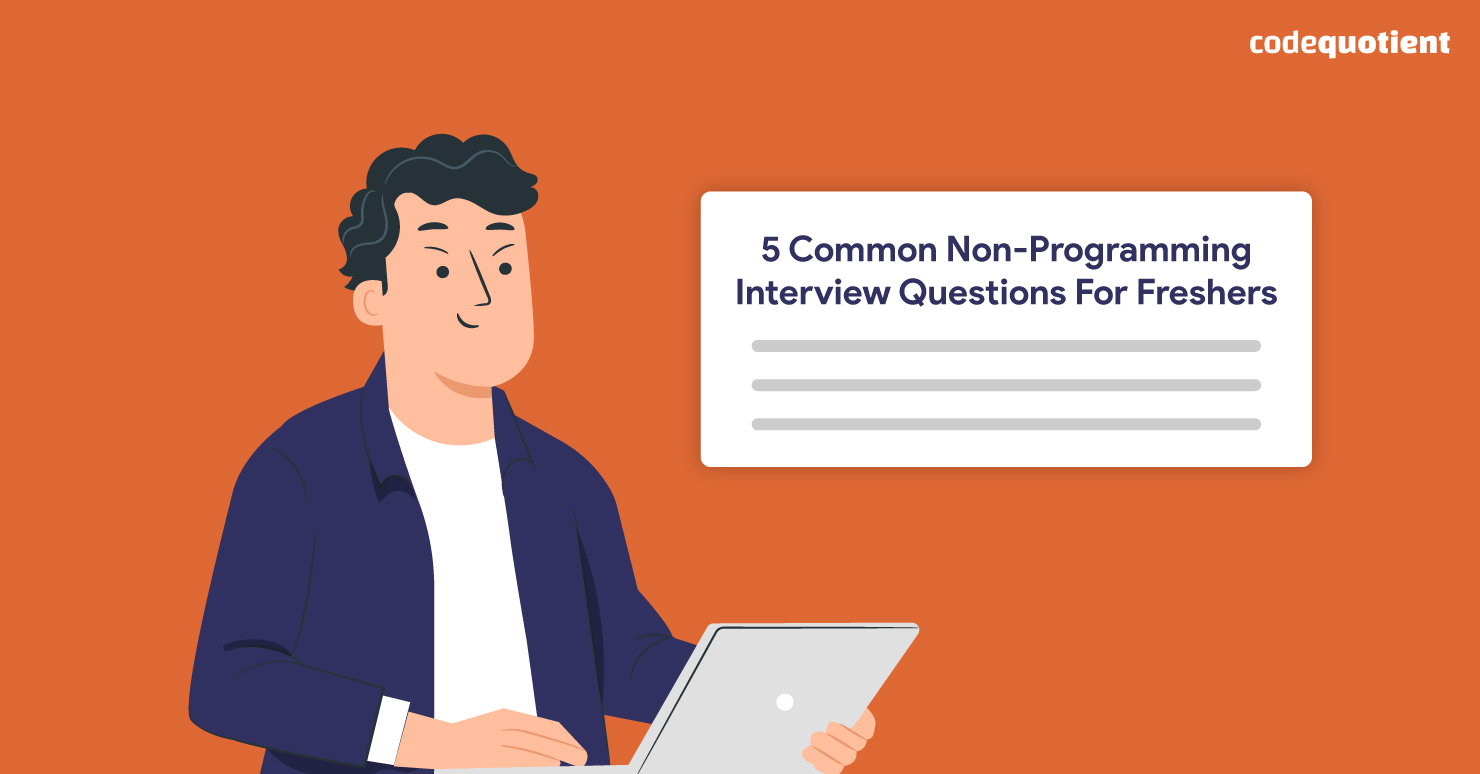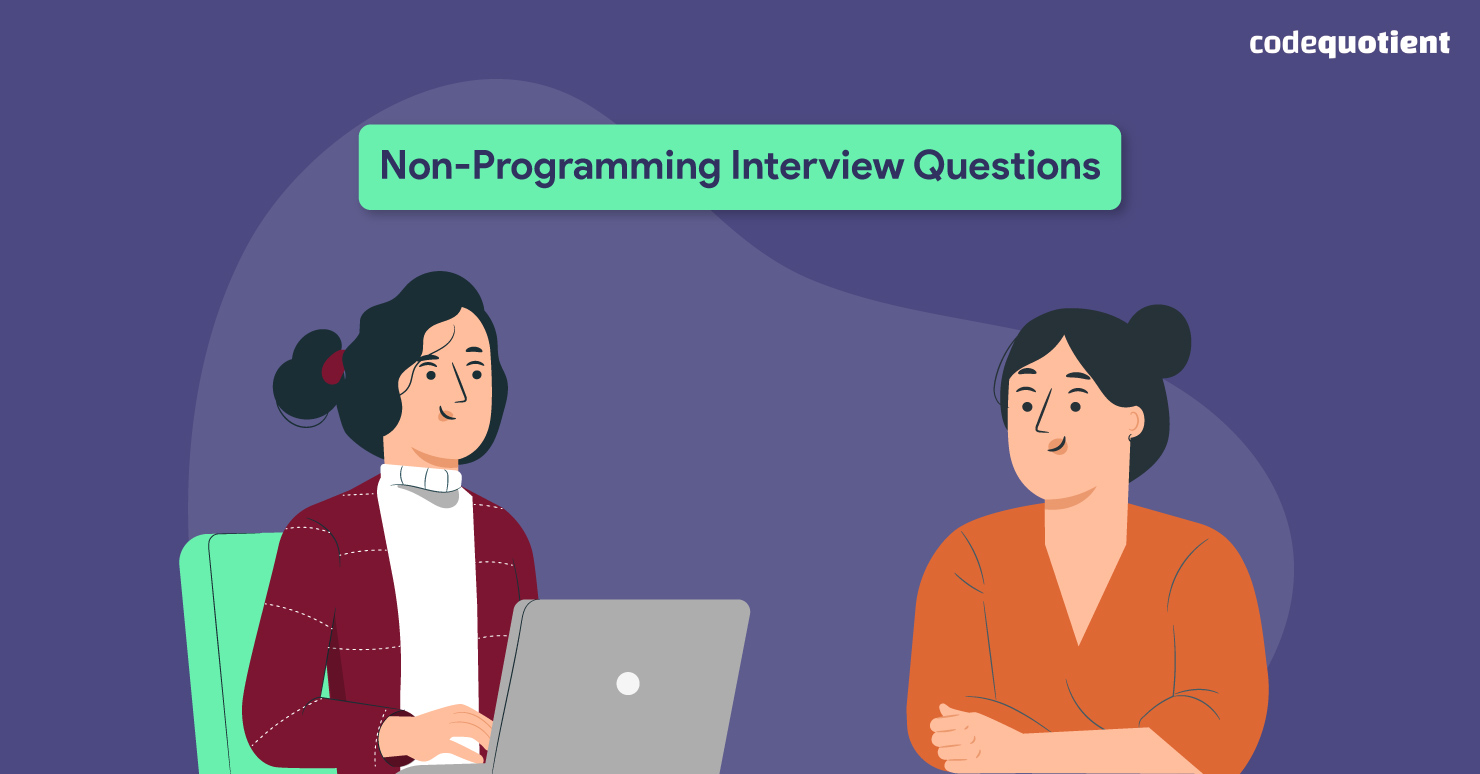As the interview round is approaching, it is normal to swing in between high spirits and anxiety. However, with a sound strategy, proper preparation, and background knowledge regarding the interviewer’s expectations, you can ace the round. We have put together a list of a few commonly asked questions and their suitable responses which freshers must know for their non-programming interview questions.
Also Read: Preparing for Coding Interviews: Amazing Tips Included To Crack Jobs At Top MNCs
5 Common Non-Programming Interview Questions For Freshers

Q1. Tell Us Something About Yourself.
This is usually the first question in any interview and serves as an icebreaker.
Objective: The interviewer wants to know more about your background and personality. Also, you can highlight your personality traits suitable for the job.
Answer: An ideal solution will start with your educational background while highlighting academic or co-curricular achievements. After this, you must briefly describe your family background.
Pro Tip:
- The answer should be brief and include your entire journey of life.
- Avoid narrating anything already mentioned in the CV.
- Drop down your achievements and learnings every few lines.
Q2. What Are Your Biggest Strengths?
This is your cue to shine and is one of the most common non-programming interview questions asked by a fresher.
Objective: The objective here is to get an insight into your skills that can come in handy in the position.
Answer: There are two ways you can answer this question. The first is to answer with your strengths, and the other is to respond with what the hiring manager wants to hear.
We strongly suggest that in answering the interviewer, pick any of your three fundamental skills and back them with appropriate examples.
If you are unsure about which personal attributes to pick, let us help you. These are the vital qualities a programmer should have:
- Critical Thinking
- Analytical Thinking
- Problem-Solving
- Detail-Oriented
- Logical
Pro-Tip: Never brag or boast of your strengths. Try to stay humble yet confident.
Q3: What Are Your Biggest Weaknesses?
As your interview continues this tricky question often pops up: “tell me about your weaknesses.”
How do you tell your future manager about your weaknesses and still manage to get qualified? But worry not. There is an easy full-proof way!
Objective: The hiring manager has two goals from this question: whether you have the correct skill set and an idea of your drawbacks.
Answer: To tackle this question, you could mention a real weakness. Then move on to discuss how you are working towards improvement. You can balance it with a positive side-effect and try to balance the effect.
A proper response could go like this:
“My biggest weakness is as a fresher, I need real-world experience. I have worked on a dozen mock projects at my university, but I should gain experience with how an experienced team works in a fully-agile environment. However, I will put my best foot forward to catch up as fast as possible!”
Q4: Which Programming Languages Can You Code With? Describe Any Experience You Have Had?
This question requires you to describe which programming languages you have learned and your experience level.
Objective: The interviewer aims to understand which languages you can code and whether you understand the bigger picture of programming.
Answer: You can mention at once the languages you know. And then, one by one, say your experience with them. You do not need to write code in the language.
For example, you can say:
“I can code in C++, C#, HTML, CSS, and JavaScript. I have made a Tic Tac Toe game using C++ and an e-commerce website using C# and Dot Net platform.
Q5: How Do You Deal With Pressure Situations When Everything Is Wrong?
Being a programming associate or executive can be a stressful job at times. And thus, you stand a chance of being asked this question.
Objective: The objective is straightforward, and the interviewer wants to assess whether you can fight the pressure or fall through the cracks when trouble happens.
Answer: It is a very commonly asked non-programming interview question. And the ideal solution to it is relatively easy.
You can respond along this line:
“I admit I am not a fan of pressure situations. But I am well adept at handling them. When faced with pressure conditions, I tend to step back, think, plan, and prioritize my actions. For example, at the university, when juggling multiple projects and assignments, I would break larger assignments into small ones and prioritize based on the following:
- How fast each of the assignments could be completed.
- Which jobs would take longer?
- Which projects had the earliest deadline?
This made me more manageable, and I have fine-tuned this mechanism with time.”
Do You Want To Ensure Your Preparation Is The Best Possible?
The interview round is undoubtedly the final and most critical round. And if you want the preparation to be optimum, expert guidance always helps.
You can trust CodeQuotient with your preparation. It is a dedicated platform with an internship like the SuperCoders Program, which offers project-based learning to help you build a portfolio and offer advanced skills.
CodeQuotient also provides resources, and helpful blogs to equip you with the best inputs for the interview and boost your preparation for the various coding and aptitude tests.
Moreover, they also open many more placement opportunities for you. And the cherry on the cake is they do not charge anything from you!
So, why wait? Apply Now!




